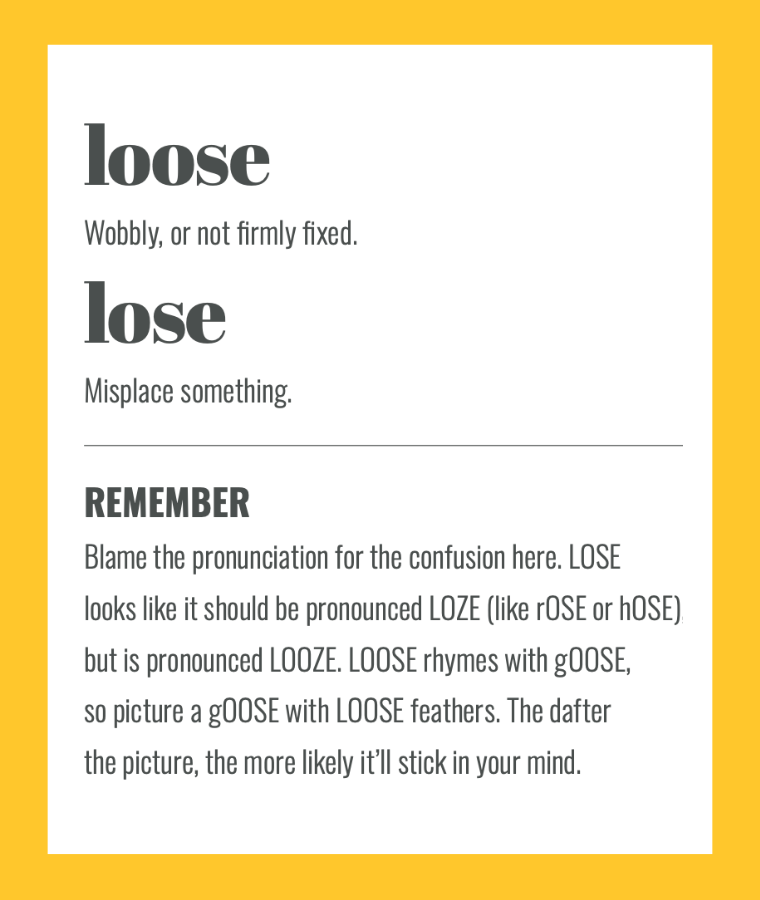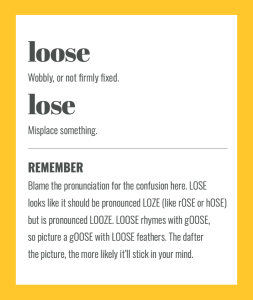Don’t lose the plot: tips to remember lose and loose

Do you know the difference between LOSE and LOOSE? Don’t learn the hard way, like Jessie J.
Last year, pop singer Jessie J admitted she’d had a tattoo of one of her song lyrics. Nothing unusual about that, maybe. But instead of ‘Don’t lose who you are in the blur of the stars’, the tattoo says ‘Don’t loose who you are in the blur of the stars’.
Imagine being tattooed with a typo. Double ouch.
It’s common for lose and loose to be mixed up, and easy to see why. But how do we avoid it?
Loose rhymes with moose and goose, but lose… well, it doesn’t rhyme with anything with the same ending.
Pose, nose and rose all end the same, but are all pronounced with an ‘oze’ sound. Only lose has an ‘oos’ sound.
What’s more, loose has the same ‘oose’ ending as choose, which rhymes with lose – gah!
When we think lose but write loose perhaps we’re thinking of loos which sounds the same, and contains a double o. But if that’s the case, we need to stop.
These tips should help you remember how to get it right:
- To write lose think of losing the second o. Or think of loser.
- Loose rhymes with moose, so picture a moose with loose antlers.
And Jessie – use a dictionary next time. Mamma Knows Best, remember?
Get more tips in The Little Book of Confusables
Spellcheck schmellcheck: why there’s no substitute for proofreading

Each time you rely on spellcheck you risk mistakes and errors in your writing. Here are some of the reasons why spellcheck is no substitute for professional proofreading.
How many times have you sent an email or distributed a document, having run it through spellcheck, only to find it contains embarrassing mistakes?
Spellcheck can be a wonderful thing. It can tell you when you’ve spelled a tricky word incorrectly – that’s one C, two Rs – but it can’t tell you when you’ve used the wrong word, or the wrong spelling of the right word.
The English language is full of homophones – words that sound the same, but have different spellings and different meanings, like the examples below:
- your, you’re
- to, too, two
- there, they’re, their
- sight, site
- board, bored
Spellcheck doesn’t know if you’ve repeated a word word, or left one out, neither does it know which word you meant to use – it only knows whether the words you’ve used are spelled right.
None of the words below would be picked up by your spellchecker, but just one letter creates a whole new meaning:
- manager, manger
- concerns, concerts
- public, pubic
- committee, committed
- assess, asses
- reduce, seduce
- deaf, dead
- brought, bought
- through, though
- quite, quit
- returning, retuning
- excited, exited
- attitude, altitude
- realise, realist
- whole, hole
So, don’t sack your spellchecker, but don’t rely on it to do your spelling for you – it’s never a substitute for proofreading.
The devil’s in the detail: avoiding the pitfalls of pitiful proofreading

We’ve all seen examples of pitiful proofreading. How do you make sure your brand isn’t next in line?
These days, brands are everything. They have their own personalities, their own Twitter feeds – even their own blogs.
We spend months developing strategic marketing plans, weeks getting our message just right, and a sizeable chunk of our budget on marketing that makes us stand out from the crowd.
It adds up to a significant investment of both time and money.
Yet how many of us have risked that investment, only to find a typo in the title at the end?
When even our gr8 gran cn spk txt, maybe it’s understandable that we think we can leave proofreading to the computer spellchecker.
We know we shouldn’t. Computers can’t check context: they don’t know if we meant there, their or they’re, affect or effect, loose or lose. And – oops! – you just spelt manager as manger. Sorry, it won’t spot that either. P45 anyone?
We’re all under pressure – our inboxes buckle under the strain of hundreds of unanswered messages, our ‘to do’ lists get longer every day, and somehow there’s never enough time… it’s no wonder we end up cutting corners. You’re too close to your own work to proofread it yourself, and your colleague’s just as busy so there’s no point asking them to do it.
Something’s got to give, right?
Perhaps, but it should never be proofreading. Mistakes damage the brand you’ve put all that time and effort into controlling. Even the smallest error can make your company look unprofessional – losing you sales, and driving customers to do business with your rivals.
Conversely, accurate copy is more convincing, more effective and a whole lot more desirable.
Consider professional proofreading as security on your investment. It may be another expense, but it’ll pay for itself many times over.
A specialist proofreader will check a lot more than your spelling. They’ll check for consistency, grammar and syntax, typographical errors, alignment – and sense.
Theirs know point making shore all you’re words our spelt write if you’re sentence makes know scents.
Neglecting proofreading is like filling your home with expensive furnishings then cutting costs by not buying locks for the doors.
As the saying goes, ‘There’s never time to do it right, but always time to do it again.’ Don’t learn the hard way.


